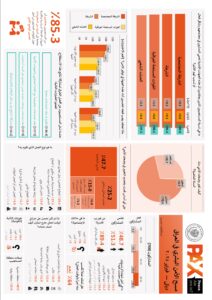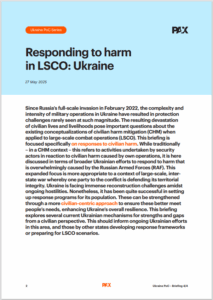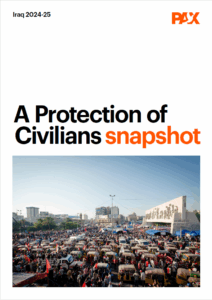Security is everyone’s business: Community Security Dialogue in Eastern Lakes, South Sudan
From 9 to 11 May, PAX joined with SSANSA and participants from Eastern Lakes communities in a three day meeting in Nyang, belonging to Greater Yirol, to discuss the current trends in security incidents in the community. The peace resolutions of 2018 between the neighboring communities Yirol, Payinjiar and Amongpiny brought peace back to the region, but during the dialogue it became clear that the Yirol community still deals with both structural problems as well as with new incidents happening at the borders.
Chiefs and representatives of women and youth groups, local police, government and prison came together at the AMA compound in Nyang/Yirol, Eastern Lakes, to discuss the 2018 outcomes of the Human Security Survey on local security perceptions in the region, list and rank local security threats and discuss a community security action plan.
Positive effect community peace resolutions
For years, the relationship between the Yirol, Payinjiar and Amongpiny communities was overshadowed by violent cattle raiding and targeted killings along the borders. The positive impact of the community peace resolutions was already confirmed in the Community Security Dialogue in Ganyiel, Payinjiar in March 2019. Similarly, the results of the data collection in Eastern Lakes communities show a general improvement of community members’ perceptions regarding local security development. The 2018 survey outcomes show that the majority of the respondents in Eastern Lakes think that their personal security situation has improved since last year (75% of Awerial county, 50% of Yirol East county and 76% of Yirol West county say that their personal security improvement has improved). 83% of all respondents feels generally safe from violence and crime in the community (compared to 74% in 2017). “We are now peaceful”, said one of the participants when discussing the current relationship with Payinijar and Amongpiny, and the other participants in the group seemed to agree.
Pakam entering the stage
While the Eastern Lakes communities are enjoying a relatively peaceful period in the region, new problems at the border seem to arise. “Nothing is happening right now, what is remaining is Pakam coming here, killing people, and taking away cows. They are creating new problems at the borders.”, said one of the chiefs. Pakam (Dinka) are originally coming from Rumbek North, and now seem to move along the borders on Eastern Lakes, which has led to unrest within Yirol communities. On 28 April, just before this community security dialogue took place, cattle communities from Yirol East raided cattle belonging to Pakam communities of Rumbek North at a water and grazing location in Amethic, near Yirol East. The fighting continued until 29 April in Nyang area, Yirol East. There were also additional cattle raids reported in Yirol East and Padiar (Yirol West). The incident in Amethic resulted in 5 deaths.
Participants mentioned that the community did try to play a part in lowering the tensions between Pakam and Yirol communities. Community members instructed the youth and sent them out as a buffer zone. However, they still continue to worry about the presence of armed Pakam youth at the borders and the latest incidents show that more needs to be done. Participants are seeking for possibilities for communication and sensibilisation efforts towards the Pakam via other parties or communities.
Structural problems in the community
When discussing the outcomes of the 2018 HSS, it became clear that the community is dealing with structural problems, which will most likely feed future conflicts in the community:
Poverty and unemployment: just like the 2018 HSS respondents (73% of the respondents think poverty or lack of livelihood opportunities will cause further conflict in the community) the participants are deeply worried about how poverty and unemployment is leading to more criminal activities in the community. They worry especially about the elderly, who can’t create and protect their own income, and youth, who are facing low education and employment possibilities. While the importance of education is recognized, good education in Eastern Lakes does not always lead to employment. As one of the participants said: “You can hold a certificate, but what is the value of that if you later sit under a tree and no salary is coming.”
Arms in the community: participants are deeply worried about the presence of arms in the community. They support the 2018 HSS result saying that 87% of the households indicate disarmament in the payam is needed for security. Opinions on how disarmament should take place within the communities differ among the participants.
Lack of well-trained and -equipped security actors and biasness in legal proceedings: The 2018 HSS data shows that 89% of the respondents think that the police takes reports from community members seriously and are helpful in resolving them. However, during the dialogue several participants highlighted the problem of lack of police posts in (remote) areas, and lack of following up on security incident in a timely and adequate manner. Local police representatives confirmed this problem. Participants support the most frequently mentioned suggestions by the 2018 HSS respondents: 1) Security actors need to be better trained (police, SPLA, local armed youth, UNMISS); 2) more presence of actors is needed (police, SPLA, UNMISS); 3) actors need to be more responsive towards civilians (police, SPLA, local armed youth, UNMISS); and 4) actors need to be better armed or equipped (police, SPLA, local armed youth, UNMISS). A specific issue being raised by the group was the lack of knowledge of Rule of Law (RoL) among police officers. They were calling for more and better RoL training for local police officers. Also, participants identified biasness in legal proceedings as a big problem.
Vulnerable groups are structurally more exposed to different types of violence: The participants to the dialogue agree with the 2018 HSS respondents’ perception that some groups in the community are more likely to be exposed to violence (74% percentage of households indicating that some people are more likely to be exposed than others). Several vulnerable groups were mentioned, but there is no clear agreement on which groups are most vulnerable. Participants seemed to agree with top vulnerable groups according to the survey: respectively elderly people, small children, people from specific ethnic groups, young women or girls (unmarried), and young men and boys. The HSS data of 2018 shows that respondents think that women and girls are most likely to be exposed to violence than men and boys (43% think that women and girls are most likely to be exposed to violence, 17% think men and boys are most likely to be exposed, and 32% think they are equally likely to be exposed). One of the police officers mentioned that regarding the violence at the borders, “it are mainly the people who are physically not able to run away who are most vulnerable”.
Time for action
The group narrowed down the list of security issues to five priority threats that need most attention in the coming months and that can realistically be addressed by Eastern Lakes authorities, security actors, participants, and the Community Security Committee.
In the next months, the Community Security Committee, consisting of representatives of the Eastern Lakes communities, will address these issues within the communities and towards local security actors and government.
In the meantime, SANSSA, AMA and PAX, will, together with the Eastern Lakes community members, keep track of the security threats in the region, will support the work of the Community Security Committee and will prepare for the next round of HSS data collection.
Most pressing security issues in need of addressing in 2019
1. Land dispute/renaming land/places
2. Cattle raiding
3. Elopement of girls and forced marriage
4. Proliferation of arms
5. Biasness in legal proceedings and lack of rule of law
About this news
Date of publication:
Jun 05, 2019
Author:
Selma van Oostwaard


